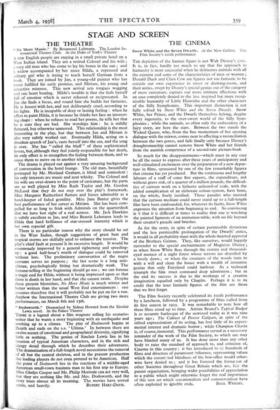THE CINEMA
Snow White and the Seven Dwarfs. At the New Gallery. The Film Society's tooth performance
THE depiction of the human figure is not Walt Disney's forte. It is, in fact, hardly too much to say that his approach to humanity is most successful when he delineates animals with all the raiment and some of the characteristics of men or women ; Donald Duck and Clara Cow are figures not too fantastic to be outside our own experience in street or drawing-room, and their antics, swept by Disney's special genius out of the category of mere caricature, capture our more intimate affections with an ease completely denied to the less inspired but more recog- nisable humanity of Little Hiawatha and the other characters of the Silly Symphonies. This important distinction is not fully solved by Snow White and the Seven Dwarfs. Snow White, her Prince, and the Dwarfs themselves belong, despite every ingenuity, to the over-sweet world of the Silly Sym- phonies ; while the animals, so often only the embroidery of a fairy story, are here the stars. Between the two stands the Wicked Queen, who, from the fine momentum of her opening dialogue with the mirror, comes near to effecting a reconciliation between the two genres, and fails finally only because Disney's draughtsmanship cannot remove Snow White and her friends from the auntish competence of a second-rate picture-book.
So much for the disappointments—which must in any case be all the easier to express after three years of anticipatory and well-stimulated excitement over the preparation of a new depar- ture in films, sponsored by one of the few remarkable figures that cinema has yet produced. But the continuous and lengthy labours of a staff of some goo experts, the expenditure, not without grave risk, of a quarter of a million pounds, the difficul- ties of cartoon work on a hitherto unheard-of scale, with the added complication of an elaborate colour-system, have been, on the whole, finely justified. Those pundits who insisted that the cartoon medium could never stand up to a full-length film have been confounded, for, whatever its faults, Snow White • engrosses the attention from beginning to end. So convincing is it that it is difficult at times to realise that one is watching the painted figments of an animation-table, with no life beyond their creator's pencils and brushes.
As for the story, in spite of certain permissible deviations and the less permissible prolongation of the Dwarfs' antics, it would in all probability meet with the whole-hearted approval of the Brothers Grimm. They, like ourselves, would happily surrender to the special enchantments of Magician Disney ; as when Snow White flees through the stormy and thousand- eyed menace of a night forest whose terrors arc dispelled by a lovely dawn ; or when the creatures of the woods turn to with a will and clean the house with a wealth of inventive genius that only Fairyland could harbour. As a technical triumph the film must command deep admiration ; but in the end its success is due to the workings of a creative. imagination equalled only by Chaplin. Perhaps it is to its credit that the least fantastic figures of the film are those that we first forget.
The Film Society recently celebrated its tooth performance by a luncheon, followed by a programme of films culled from its first season in 1925. It was remarkable to note how all three films stood up to time. Adrian Brunel's Typical Budget is as accurate burlesque of the newsreel today as it was nine years ago ; The Cabinet of Doctor Caligari, in spite of the stilted expressionism of its acting, has lost little of its experi- mental interest and dramatic horror ; while Champion Charlie is, of course, immortal. This performance served as a necessary reminder of the work of the Film Society, to which use may have blinded many of us. It has done more than any other body to raise the standard of approach to, and criticism of, Cinema in this country ; it has introduced to t= hundreds of films and directors of paramount influence, representing values which the constri-ied blindness of the box-office would other- wise have denied us ; and it has fostered the formation of other Societies throughout Great Britain which arc, liae the parent organisation, bringing wider possibilities of appreciation to a public which might otherwise forget the rear importance of this new art which sensationalism and commercialism have
often exploited to ignoble ends. BASIL WRIGHT.






































































 Previous page
Previous page